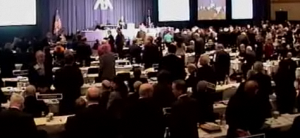ABA House OKs Lateral Lawyer Ethics Rule Change

Delegates standing in opposition to screening rule during
vote count. Screen shot from live webcast.
After a debate that lasted more than 90 minutes—the longest so far today—the ABA’s policymaking House of Delegates adopted Resolution 109, an ethics rule that allows a firm to “screen” a lawyer who joins it from any participation in a case that might create conflicts for clients represented by the lawyer at his or her former firm.
It was the third time this decade the House had considered such a rule change, and the first time it passed. If adopted by states—and 24 states already have similar rules—it will make it easier for lawyers to move from firm to firm, reducing the power of clients.
The House was faced with dueling propositions, Resolutions 109 (PDF) and 110 (PDF). Res. 109 allows the firm to which a lawyer moves hang on to clients, even if the lawyer represented adverse parties at his or her old firm.
In 2002, the House rejected a proposal by the ABA’s Ethics 2000 Commission to amend Model Rule 1.10 to allow a firm to “screen” the incoming lawyer from any participation in a case that might create conflicts for clients represented by the lawyer at his or her former firm. With screening, one lawyer’s conflict of interest would not require the entire firm to be disqualified from a case, as it would be under Model Rule 1.10 in its current form.
The Standing Committee on Ethics and Professional Responsibility picked up the cause in 2008, but the House tabled the measure at the 2008 annual meeting in August by a single-vote margin. The committee brought essentially the same recommendation back today.
The ABA’s Section of Litigation submitted an alternative recommendation, Res. 110, which would permit screening only when a lawyer had no substantial involvement in or material information about the previous firm’s representation of the new firm’s adverse client.
The House rejected Litigation’s Res. 110 by a vote of 267 to 182. Res. 109 was passed by a vote of 226 to 191. They were the only votes so far today that needed more than a voice vote to determine.
But before the votes, there was a passionate debate. Robert Mundheim of New York, chair of the ABA’s Standing Committee on Ethics and Professional Responsibility, told the House that Res. 109 makes the “screening process transparent and fully visible.”
James McCauley, the Virginia State Bar ethics counsel, later countered that argument, saying “Report 109 is telling the organized bar, courts and public that lawyers with a substantial role may terminate that role, abandon the client, and join the law firm that represents that lawyer’s adversary. Ladies and gentlemen, that is not transparency.”
Illinois has had a rule similar to that in Resolution 109, and for the last 15 years, none of the state’s 93,000 ethics complaints have alleged a violation of it, Mundheim said.
An impassioned Lawrence Fox of Philadelphia, speaking on behalf of the Section of Litigation and Res. 110, said “no violations were reported because they all take place behind a black curtain. The client can’t know” a violation occurred.
The ABA “could lose this role [of writing ethics rules] if we put the interest of lawyers ahead of clients,” he said. “There are no clients here” to protect their interests.
Paula Boggs, general counsel of Starbucks, effectively made the case there were clients present, speaking in favor of Res. 109. She noted that ethics rules allow government lawyers to join firms which are litigating against the government, so long as they are screened from the matters and keep the government’s confidences.
She has found herself in that situation. “It makes no sense that I can leave the Department of Justice for a firm doing mortal combat with DOJ, but if I move from company A to firm A” screening is not sufficient.
“If a firm can effectively screen the former government lawyer, why can’t it screen the former in-house lawyer?” she asked.
But John T. Berry, representing the National Organization of Bar Counsel, had a different view. He claimed that “common sense tells us of what clients think of this issue. If they don’t care, you won’t have any problems getting their consent” to have your new firm represent the adverse party.
Updated on Feb. 18 to include revised version of Resolution 109.



